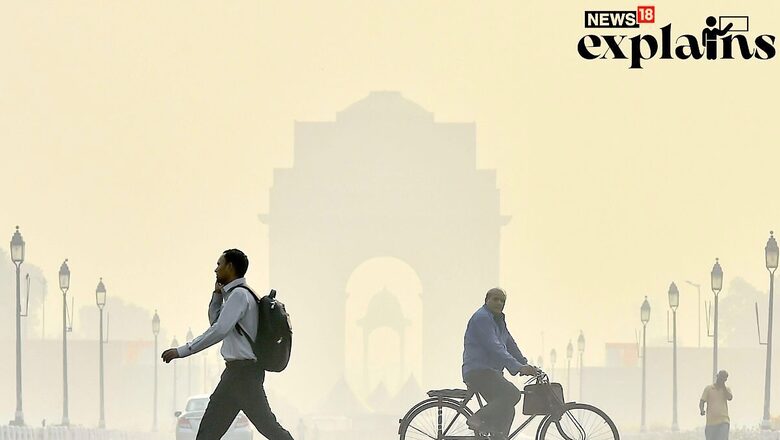
views
The air quality in Delhi fell to the ‘Very Poor’ category on Monday with the Air Quality Index (AQI) at 306 against 302 recorded on Sunday afternoon. Visuals from India Gate, Kartavya Path, Nehru Park and Teen Murti Marg showed parts of the national capital engulfed in a thick layer of smog.
After receiving more than 200 days of good or moderate AQI this year, the pollution levels in the national capital deteriorated earlier this October. Delhi last recorded “very poor” air quality on May 17 when the AQI was 336.
India Meteorological Department officials stated that the air quality in Delhi-NCR will remain “very poor” for the next few days due to a drop in temperature and the influx of emissions from stubble burning.
The Commission for Air Quality Management (CAQM), a statutory body, has implemented Stage II of the Graded Response Action Plan (GRAP) in the Delhi-NCR to combat air pollution during the winter season.
What is a Graded Response Action Plan?
The Graded Response Action Plan (GRAP) is a set of anti-air pollution measures, generally implemented in Delhi-NCR during the winter. Under GRAP, the government introduces several measures including strict restrictions on the plying of obsolete vehicles and a ban on the use of coal and firewood in eateries, restaurants and hotels when the AQI breaches the 200-mark.
If the AQI crosses the 400-mark, BS-III petrol and BS-IV diesel four-wheelers shall be immediately banned in Delhi and Gurugram, Faridabad, Ghaziabad and Noida.
Under the current Stage II of GRAP, the CAQM has directed authorities in the NCR to increase parking fees to discourage private transport and enhance the services of CNG or electric buses and metro trains amid a likely increase in pollution levels. The decision comes as the AQI has worsened over the past few days and is expected to dip further as winter sets in India prepares for various festivals.
Four Stages of GRAP
The GRAP in Delhi and NCR is implemented in four different stages based on the air quality in the national capital.
Stage 1 comes into implementation during ‘poor’ AQI (201-300); Stage 2 during ‘very poor’ AQI (301-400); Stage 3 during ‘severe’ AQI (401-450); and Stage 4 during ‘severe plus’ when AQI is over 450.
Here are the set of retractions during the four stages of GRAP:
- Stage I: Stage I mandates the suspension of work at private construction and demolition projects with a plot size equal to or exceeding 500 square metres that are not registered on the state government’s portal for remote monitoring of dust mitigation measures. Authorities are also tasked with enforcing a complete ban on the use of coal and firewood in ‘tandoors’ at hotels, restaurants and open eateries, along with taking punitive action against polluting industrial units and thermal power plants within 300 kilometres of Delhi.
- Stage II: Stage II measures involve increasing parking fees to discourage private transport and enhancing CNG or electric bus and metro services by introducing additional fleets and increasing service frequency. It also includes the use of public transport and minimize the use of personal vehicles.
- Stage III: In Stage III, BS-III petrol and BS-IV diesel four-wheelers are prohibited from operating in Delhi, Gurugram, Faridabad, Ghaziabad, and Gautam Buddh Nagar. Stage III involves a complete halt on construction and demolition work, except for essential government projects, besides mining and stone crushing.
- Stage IV: Stage IV includes banning all types of construction and demolition work. State governments are authorised to decide on online classes for school students and work-from-home arrangements for government and private offices during such situations.
What is Delhi Govt Doing to Combat Pollution
In view of the rising population, Delhi Environment Minister Gopal Rai will chair a meeting today with the with departments concerned on the implementation of mitigating measures under the central government’s pollution control plan.
The CAQM has directed the authorities to enhance services of CNG or electric buses and metro trains amid a likely increase in pollution levels.
The AAP government, in a meeting of states with the Centre, has also urged the Union environment ministry to impose a complete ban on firecracker burning and the movement of diesel buses across the National Capital Region.
Rai has said that the Delhi government has taken numerous steps to curb air pollution during the winter season but these steps won’t be effective unless Haryana, Rajasthan and Uttar Pradesh address the sources of pollution in the NCR region.
However, at least four plans announced by the Delhi government to curb the rising pollution since 2022 are yet to take off, The Hindu reported.
The plans include making pollution under control (PUC) certificates compulsory for motorists before buying fuel, engaging machines to clean roads and reduce dust, conducting workshops on ‘urban farming’, and “world-class” redeveloping of 17 city forests.
(With inputs from PTI)
















Comments
0 comment